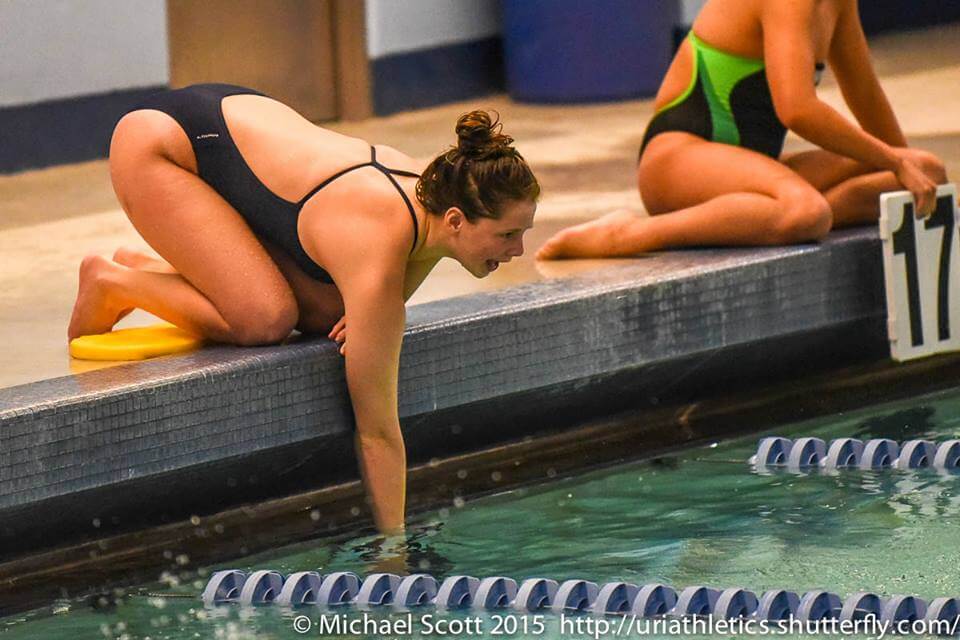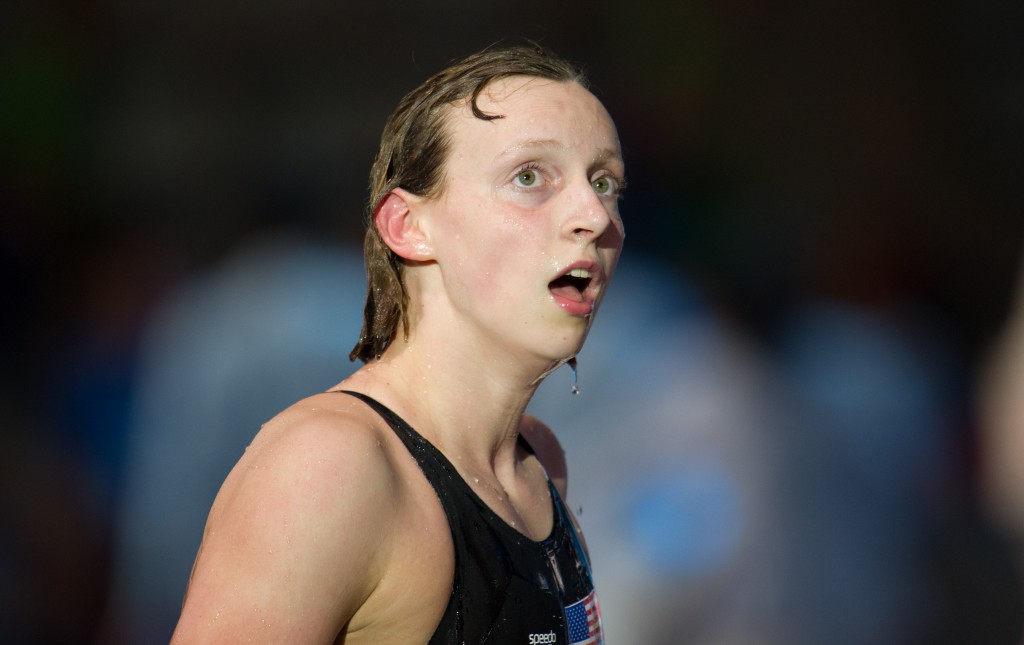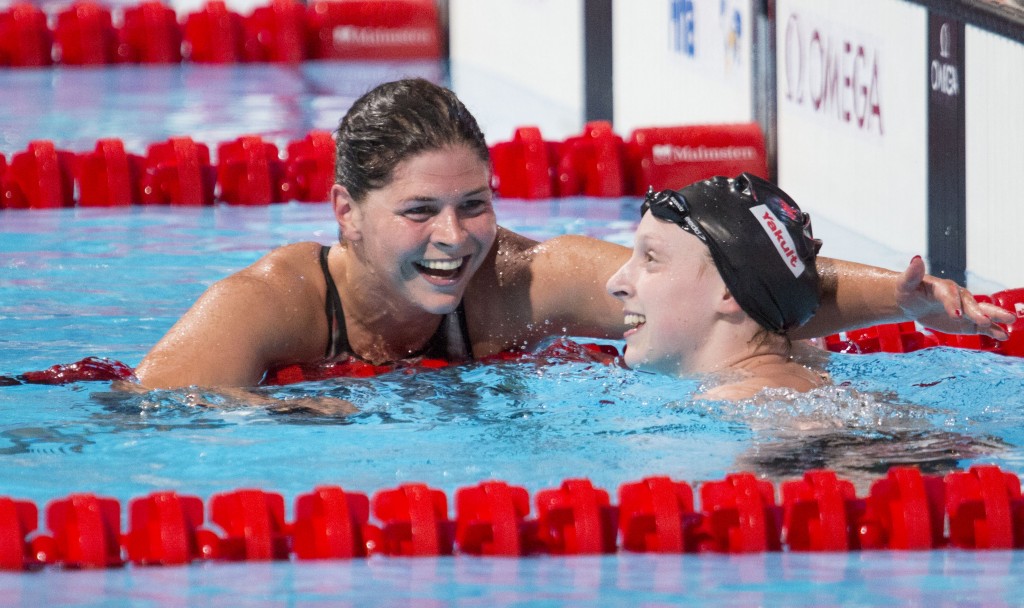The Case for the Women’s 1500 In the Olympic Lineup

By Sarah Lloyd, Swimming World College Intern
A couple of weeks ago, one of my campers asked me if I thought Katie Ledecky would break the world record in the 1500 in Rio next year.
“No,” I said, and as only young children can do, she cocked her head to one side, looking puzzled and asked “Why?” I then had to explain that in the Olympics, women only swim up to the 800. “Do boys get to swim the 1500?” she asked. “Yes,” I replied, to which she exclaimed “Well THAT’S not fair!” And she’s right.
The Common Case Against
In the swimming family, distance is somewhat of the black sheep. It’s easy for swimmers and spectators alike to be interested in the sprints because they’re immediately and intensely exciting–the finish of the 50 always brings about a collective gasp. IMs can be just as interesting because the lead changes based on different swimmers’ strengths throughout the race. Watching any race of a stroke can leave non-swimmers ogling at the skill and strength that’s required to complete a 200. Relays are universally loved for the camaraderie and unpredictability–hello men’s 4×100 in Beijing.
Distance swimming, however, takes a different level of patience and understanding. My mom used to joke that she could watch the start of my mile, go to the bathroom and get a meal from the concession stand, and still be back to see me finish.
During meets, distance events are often relegated to a middle session, leaving few spectators other than distance swimmers themselves, their coaches, and their parents. Distance events, especially the 1500, have a difficult time gathering a large spectator base, which is why many oppose the women’s 1500 in the Olympics–people may not even watch it, so why bother?
While this argument could make sense if the broadcasting networks, like NBC, were the governing bodies of the Olympic events and if the Games were purely for the entertainment of the viewers, instead of say, bringing nations together for top-notch competition, the fact is, while the Olympics are exciting to watch, their purpose is not to bring in ratings.
That being said, the broadcasting companies are not the governing bodies and they don’t have sway over the programs. The decision to include the women’s 1500 is up to FINA and the IOC. And they’re dragging their feet.
A Quick History
The first modern Olympic Games were held in Athens, Greece in 1896. Swimming was included in the first Olympic program, but with just a few events for men only. By the 1904 Games, the 1500 freestyle had made it into the program for the men. Women did not compete on the Olympic stage until 1912, and even then, they swam only two events– the 100 freestyle and the 4×100 freestyle relay. Fast forward to 1968 when the women were finally allowed to compete in the 800 freestyle; they were previously thought to be too “delicate” to compete in the longer races.
What took only two Olympiads for the men to achieve–a real distance race, took 15 for the women and even then, they got a watered down version of the ultimate distance race in a pool.
Necessary Changes
Women have proven time and time again that they are just as capable of long distance swimming as men. Diana Nyad proved this beyond a doubt when she became the first person–man or woman–to swim from Cuba to Florida, a distance of 110 miles. Ledecky’s best 1500 time of 15:28.36 is easily under the men’s qualifying time for the 2016 US Olympic Trials of 15:49.99.
Lauren Boyle of New Zealand and Denmark’s Lotte Friis are consistently on or under the 16-minute mark in the 1500 as well. And as far as I know, there haven’t been any elite women pulled out of the water during the 1500 due to their “fragility” or lack of strength.
Besides the fact that women swim the 1500 at Worlds and the pro-circuit meets, FINA approved the 10K open water distance for both men and women for the 2008 Beijing Games. It seems counterintuitive to tell women that they are capable of swimming a 10K in open water, but not a 1500 in a pool.
And while FINA may not be blatantly sexist in its refusal to include the women’s 1500 in the Olympics, its reluctance to change the program brings up the lingering ideology that women are somehow weaker and inferior to men. Women can serve in the armed forces, run the same distances as men in Olympic track and field events, and play the same duration in international soccer matches–they deserve the right to compete in the 1500 on the world’s largest stage.
I, for one, impatiently await the change in the women’s Olympic program.






Way over due. I hope the current Fina and IOC leaders get their heads out of their keester and make the women’s 1500 an official event.
My 15 year old daughter would love the 1500 in the Olympics.
Heck the swim program should expand to have more relays.
One for each stroke like we have for the freestyle events.
This would increase the Olympic teams and world team opportunities for all countries and both genders.
What a wonderful article. As a mom of son that is a distance swimmer, I would think all events should be available for all swimmers.
I would like to see an 800m medley relay for both men and women, as well as an 800m free relay added for women at the world level….
Watching the athletic and strategic duel in the water (1500m) is every bit as exciting as a sprint and done. (Don’t want to take away from one to benefit another.)
How many women serve on the FINA Board? How many women serve on the IOC?
As I researched for this article, I discovered that on the 35-member governing bureau for FINA, there is not one woman. I couldn’t find numbers on the IOC.
Well I would have considered the 200 a distance event but if the men have that event so should the women
Agree, and the 800 Free for men.
Kind of irrelevant if they’re wanting events held at 2am local time. Olympics clearly not the place for top swimming, just TV exposure.
Should W1500 be added, there has to be the corresponding addition of M800 to equalise number of events between genders. Whilst I would have no problems, I strongly suspect the TV lobby would not be supportive and those without cable are likely to have an additional two events where they they will be subjected to “crosses” to other events.
Regrettably, TV networks DO bring influence to bear on Olympic programs as has been seen with the reversal of heats and finals in Rio as was the case for Beijing. NBC already have their bought and paid for IOC point-man in Alex Gilady (nominally Israel but SVP NBC Sports).
Real-politik suggests the addition of 50m events for the form-strokes would be more likely additions but with the IOC seeking to cap athlete numbers, it’s highly likely that neither proposition is successful.